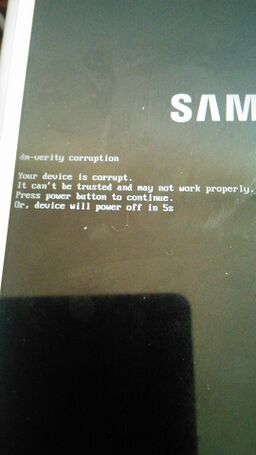Samsung Galaxy Tab A7 Lite (samsung-gta7litewifi)
 The postmarketOS "Loading..." screen on a Samsung Galaxy Tab A7 Lite | |
| Manufacturer | Samsung |
|---|---|
| Name | Galaxy Tab A7 Lite |
| Codename | samsung-gta7litewifi |
| Released | 2021 |
| Type | tablet |
| Hardware | |
| Chipset | MediaTek Helio P22T (MT8768) |
| CPU | ARM Cortex A53 MPCore |
| GPU | PowerVR GE8320 |
| Display | 800x1340 TFT LCD |
| Storage | 32GB or 64GB, depending on the specific model |
| Memory | 2GB, 3GB, or 4GB, depending on the specific model |
| Architecture | aarch64 |
| Software | |
| Original software | Android |
| Original version | 11 |
| Extended version | 13 |
| FOSS bootloader | no |
| postmarketOS | |
| Category | testing |
| Pre-built images | no |
| Mainline | no |
| postmarketOS kernel | 4.19.191 |
| Unixbench Whet/Dhry score | 0.0 |
| Flashing |
No data |
|---|---|
| USB Networking |
Works |
| Internal storage |
No data |
| SD card |
No data |
| Battery |
No data |
| Screen |
Broken |
| Touchscreen |
No data |
| Multimedia | |
| 3D Acceleration |
Broken |
| Audio |
No data |
| Camera |
No data |
| Camera Flash |
No data |
| Connectivity | |
| WiFi |
No data |
| Bluetooth |
No data |
| GPS |
No data |
| NFC |
No data |
| Miscellaneous | |
| FDE |
No data |
| USB OTG |
No data |
| Sensors | |
| Accelerometer |
No data |
| Magnetometer |
No data |
| Ambient Light |
No data |
| Proximity |
No data |
| Hall Effect |
No data |
| Haptics |
No data |
| Barometer |
No data |
| Power Sensor |
No data |
| WARNING: Make sure that you are prepared to lose functionality before installing postmarketOS. Samsung Knox will blow an efuse when the OS is modified that will permanently disable Knox-only features like Samsung Pay, and you will NEVER be able to use those features again. |
| While the kernel compiles and flashing is available, this device is in an extremely early state of development. Here Be Dragons |
Contributors
hexaheximal
Users owning this device
- Hexaheximal (Notes: maintaining the postmarketOS port, 3GB RAM 32GB eMMC model)
- Zillion (Notes: T220, Currently running OneUi for kernel development)
Unlocking the bootloader
At least at first, the Android settings app does not allow you to enable bootloader unlocking. (On some devices it requires that it can connect to Samsung's servers first, but I would not recommend ever connecting it to the internet on stock Android)
However, it can be done with mtkclient:
$ mtk e metadata,userdata,md_udc
$ mtk da seccfg unlock
If it worked you should see a warning like this:
Do not panic! Your device is not broken!
If you *don't* see that warning, then it didn't work.
You can safely skip the warning, although on stock Android it might fail to boot in which case you will need to choose the factory reset option to clear userdata etc. again.
Installation
You will need to run pmbootstrap to build the boot.img:
$ pmbootstrap init
$ pmbootstrap install
$ pmbootstrap flasher flash_kernel
$ pmbootstrap flasher flash_rootfs
Reading logs
Before reading the logs, make sure to install mtkclient and then erase the expdb partition so the existing boot logs don't get mixed in and get confusing:
$ mtk e expdb
Once you have done that, boot the device. As soon as it powers off during a bootloop (and if it doesn't, hold down Power + Volume Down for ~10 seconds), run these commands:
$ mtk r expdb /tmp/expdb.bin
$ mtk reset # turns the device off, optional
$ cat /tmp/expdb.bin
Please note that the kernel part of the logs is quite a mess - it does not use proper newlines and instead uses what seems to be null bytes.
Downstream kernel status
The downstream kernel panics almost as soon as it boots into the kernel when compiled from source, but when using the prebuilt kernel & dtb it boots and USB Networking even works.
Mainline kernel status
The MT6765 close-to-mainline kernel does not boot due to the android bootloader refusing to boot with a dummy dtbo.
See also
